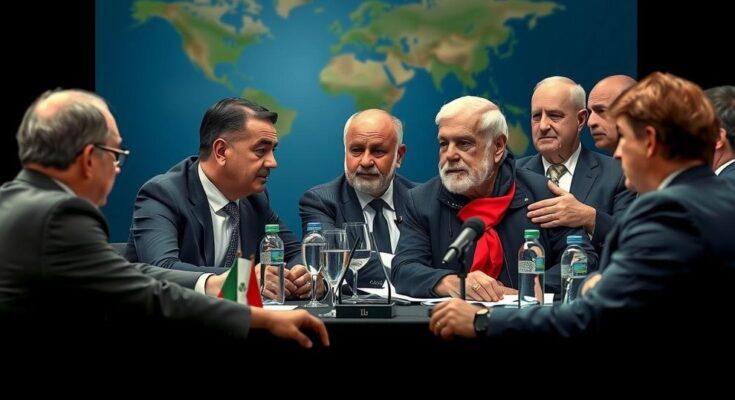At the G20 summit in Brazil, world leaders are focused on pressing challenges including ongoing conflicts in the Middle East and Ukraine, climate change negotiations, and implications of Donald Trump’s re-emergence in U.S. politics. Amidst hopes for a cohesive declaration on these matters, significant tensions persist regarding financial commitments required for climate action and the unity among members on their respective positions.
World leaders convened in Rio de Janeiro, Brazil, for the G20 summit, focusing on critical issues including the ongoing conflicts in the Middle East and Ukraine, climate change negotiations, and the political implications of Donald Trump’s electoral resurgence. The summit, held on Monday and Tuesday, is characterized by underlying tensions regarding joint declarations and necessary financial commitments for climate action. Brazilian President Luiz Inácio Lula da Silva welcomed dignitaries and emphasized the importance of tackling poverty and hunger amid the backdrop of geopolitical conflicts. As critical topics in the summit’s agenda, the wars affecting G20 countries and global climate initiatives were at the forefront. A Brazilian foreign ministry representative indicated that the finalized draft communiqué faced demands for renegotiation on aspects related to these conflicts. Meanwhile, President Biden’s newly authorized strategy enabling Ukraine to utilize long-range missiles to target Russian positions may shift the stance of European allies regarding their assistance to Ukraine. Additionally, G20 leaders are facing pressure to revive stalled United Nations climate talks in Azerbaijan, specifically regarding the proposal to raise $1 trillion annually in funding for developing nations combatting climate change. UN Secretary-General Antonio Guterres urged G20 members, responsible for 80 percent of global emissions, to demonstrate leadership in facilitating this deal. The summit is held under heightened security, following a recent failed bombing attempt linked to far-right extremism in Brazil. With President Biden attending what could be his final G20 summit, he aims to solidify his climate legacy despite the impending return of his predecessor. Concurrently, leaders are urged to renew commitments made during the previous G20 in India, which emphasized a significant expansion of renewable energy while stopping short of firm fossil fuel phase-out pledges. It is crucial that discussions maintain focus on alleviating poverty, an issue voiced by Lula, who expressed concerns over sidelining significant hardships faced by vulnerable populations in conflict-free regions. Lula initiated discussions on the establishment of a “Global Alliance against Hunger and Poverty,” alongside calls for imposing higher taxes on billionaires, although his agenda faces challenges from Argentina’s leadership. Despite differing views, the Brazilian foreign ministry seeks to maintain a unified stance among G20 members, aiming to achieve a consensus on critical global economic and environmental matters.
The G20 summit is a significant global event involving the major economies of the world, focusing on mutual concerns impacting international stability and development. The agenda of this particular summit includes urgent geopolitical challenges, particularly the conflicts in Ukraine and the Middle East which have been contentious points among member states. Concurrently, climate change remains a crucial topic as negotiations continue to stall on how best to achieve funding commitments essential for developing nations. The backdrop of Donald Trump’s comeback following the US elections adds an additional layer of complexity to global political dynamics. Brazil’s President Lula aims to steer discussions toward not just climate action but also pressing issues surrounding poverty and hunger, which resonate deeply with his own background.
The G20 summit in Brazil brings vital international leaders together to confront numerous pressing challenges, such as ongoing geopolitical conflicts and climate issues, alongside socio-economic disparities. The divergence of opinions among the members, particularly concerning proposed declarations and measures for climate finance, underscores the complexity of achieving a unified strategy. President Lula’s initiatives to spotlight global poverty illustrate the diverse agenda within the G20 framework, which seeks to address the immediate concerns while paving the way for future cooperation among world’s leading economies.
Original Source: www.france24.com




